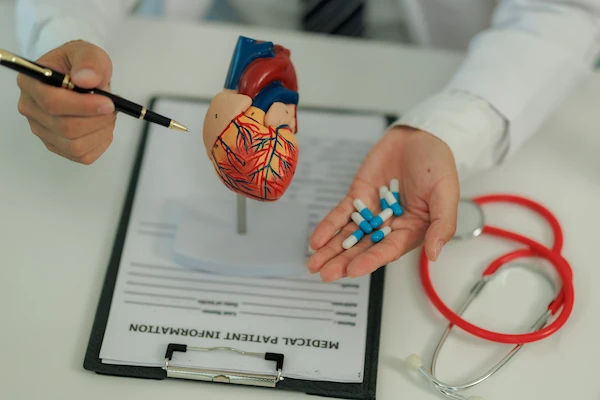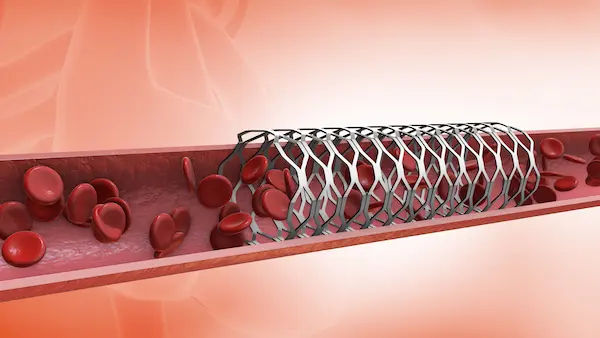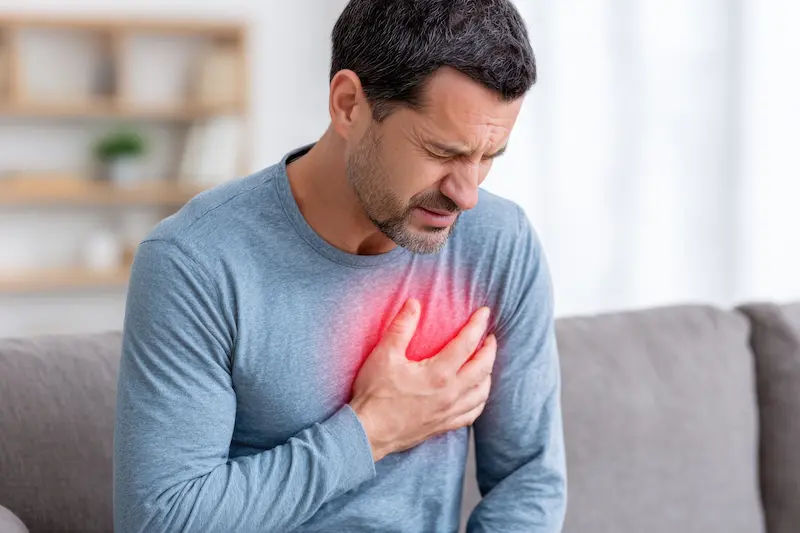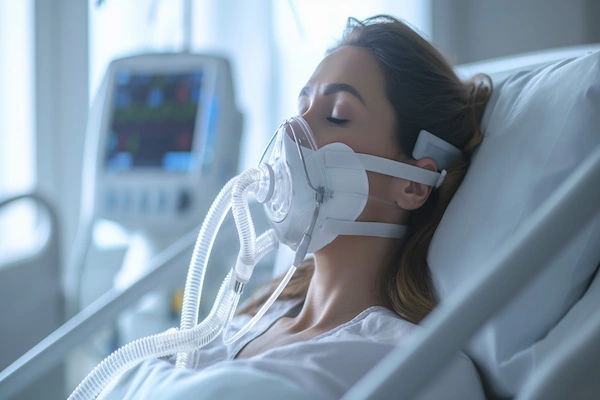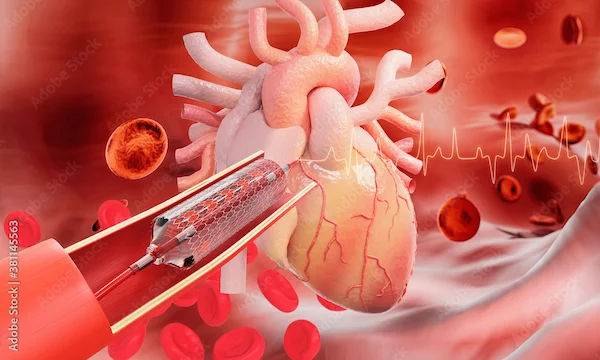Breathing Problem After Angioplasty
Breathing problems after angioplasty can be a sign of complications. Learn about causes, symptoms, and when to seek urgent medical care for respiratory issues post-procedure.

Written by Dr. J T Hema Pratima
Reviewed by Dr. Rohinipriyanka Pondugula MBBS
Last updated on 10th Oct, 2025

Introduction
If you or a loved one has recently undergone angioplasty and is experiencing breathing difficulties, you may be concerned about what’s causing it and how to manage it. While angioplasty is a common and generally safe procedure to improve blood flow to the heart, some patients may face breathing issues afterwards. This article will help you understand why this happens, what symptoms to watch for, and how to take care of yourself post-surgery.
Why Do Breathing Problems Occur After Angioplasty?
Angioplasty is a procedure where a blocked or narrowed coronary artery is widened using a small balloon and often a stent to keep the artery open. While it improves heart function, some patients may experience breathing difficulties due to:
1. Fluid Retention (Pulmonary Oedema):
After angioplasty, the heart may take time to adjust, leading to fluid buildup in the lungs.
This can cause shortness of breath, especially when lying down.
2. Anxiety or Stress:
Undergoing heart surgery can be stressful, leading to rapid, shallow breathing.
3. Medication Side Effects:
Some post-angioplasty medications (like beta-blockers) may cause mild breathing issues.
4. Underlying Heart Condition:
If the heart is still weak (e.g., after a heart attack), it may struggle to pump blood efficiently, leading to breathlessness.
5. Lung-Related Issues:
Sometimes, fluid or inflammation in the lungs (pleural effusion) can occur after surgery.
Symptoms to Watch For
While mild breathlessness is common, consult a doctor immediately if you experience:
Severe shortness of breath (even at rest)
Wheezing or gasping for air
Chest pain along with breathing difficulty
Swelling in legs or ankles
Bluish lips or fingertips (sign of low oxygen)
How to Manage Breathing Problems After Angioplasty?
Here are some practical tips to help you navigate your recovery smoothly and maintain your well-being after angioplasty.
1. Follow Your Doctor’s Advice
Take prescribed medications (diuretics, blood thinners, or beta-blockers) as directed.
Attend follow-up appointments to monitor recovery.
Consult Top Cardiologists For Personalised Tips
2. Monitor Fluid Intake
If fluid retention is an issue, limit salt intake to reduce swelling.
Drink enough water but avoid excessive fluids if advised by your doctor.
3. Practice Breathing Exercises
Deep breathing exercises can help improve lung function.
Try diaphragmatic breathing: Inhale deeply through your nose, hold for a few seconds, and exhale slowly.
4. Stay Active (But Don’t Overexert)
Light walking helps circulation but avoid strenuous activities.
Cardiac rehabilitation programs can guide safe exercises post-angioplasty.
5. Sleep in a Slightly Elevated Position
Use an extra pillow to reduce breathlessness at night.
6. Avoid Smoking & Alcohol
Smoking worsens lung and heart health.
Alcohol can interfere with medications and fluid balance.
7. Manage Stress & Anxiety
Meditation, gentle yoga, or counselling can help reduce stress-related breathing issues.
When to Seek Medical Help?
If breathing problems persist or worsen, consult your doctor immediately. You may need:
Additional tests (chest X-ray, echocardiogram)
Adjustment in medications
Further treatment if fluid buildup or heart function is affected
Conclusion
Breathing difficulties after angioplasty can be concerning, but they are often manageable with proper care. Follow your doctor’s advice, stay mindful of symptoms, and make necessary lifestyle adjustments. If you’re experiencing persistent issues, don’t hesitate to seek medical help.
If you have concerns about post-angioplasty recovery, you can consult a cardiologist via Apollo 24|7 for personalised guidance. Book an appointment today for a smooth and healthy recovery!
Consult Top Cardiologists
Consult Top Cardiologists For Personalised Tips

Dr. Tripti Deb
Cardiologist
40 Years • MBBS, MD, DM, FACC, FESC
Hyderabad
Apollo Hospitals Jubilee Hills, Hyderabad

Dr. Anand Ravi
General Physician
2 Years • MBBS
Bengaluru
PRESTIGE SHANTHINIKETAN - SOCIETY CLINIC, Bengaluru
Dr Moytree Baruah
Cardiologist
10 Years • MBBS, PGDCC
Guwahati
Apollo Clinic Guwahati, Assam, Guwahati

Dr. Zulkarnain
General Physician
2 Years • MBBS, PGDM, FFM
Bengaluru
PRESTIGE SHANTHINIKETAN - SOCIETY CLINIC, Bengaluru
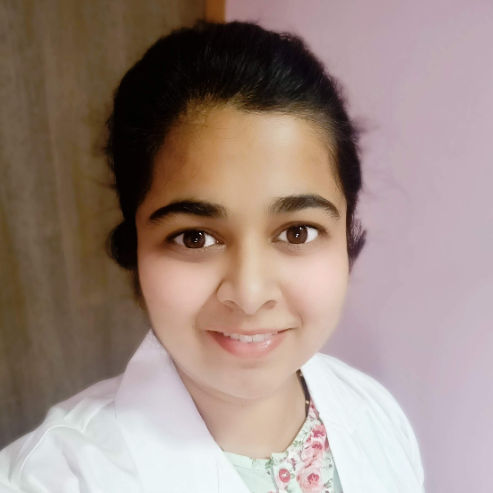
Dr Nazneen Khan
Cardiologist
7 Years • M.B.B.S, M.D (MEDICINE), DrNB CARDIOLOGY
Pune
Apollo Clinic, Viman Nagar, Pune
Consult Top Cardiologists

Dr. Tripti Deb
Cardiologist
40 Years • MBBS, MD, DM, FACC, FESC
Hyderabad
Apollo Hospitals Jubilee Hills, Hyderabad

Dr. Anand Ravi
General Physician
2 Years • MBBS
Bengaluru
PRESTIGE SHANTHINIKETAN - SOCIETY CLINIC, Bengaluru
Dr Moytree Baruah
Cardiologist
10 Years • MBBS, PGDCC
Guwahati
Apollo Clinic Guwahati, Assam, Guwahati

Dr. Zulkarnain
General Physician
2 Years • MBBS, PGDM, FFM
Bengaluru
PRESTIGE SHANTHINIKETAN - SOCIETY CLINIC, Bengaluru

Dr Nazneen Khan
Cardiologist
7 Years • M.B.B.S, M.D (MEDICINE), DrNB CARDIOLOGY
Pune
Apollo Clinic, Viman Nagar, Pune
